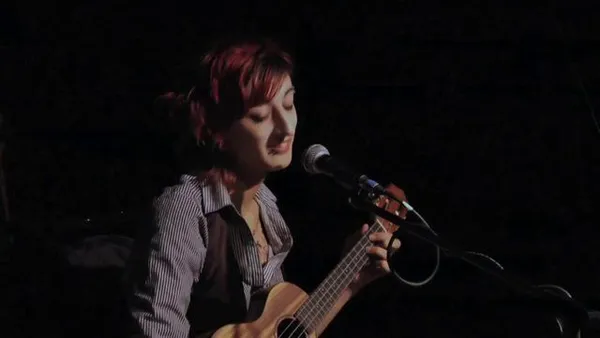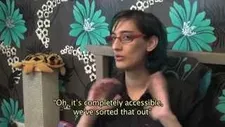 |
| Maki Yamazaki |
I’m Not Your Inspiration is a series of films looking at queer and trans deaf and disabled artists in Scotland. As Sandra Alland prepares to screen the third instalment, featuring musician and visual artist Maki Yamazaki, at the Glitch film festival in Glasgow, we ask her how she encountered her subject.
“Maki came to see my performance at Liverpool’s Unity Theatre in 2011,” says Sandra, who works in a number of different and overlapping art forms. “When we met later, Maki showed me some of their music. As a curator, I’m always on the lookout for emerging artists. I was especially intrigued by Maki’s musical persona, Dr Carmilla, so I programmed the “lesbian vampire from outer space” for Cachín Cachán Cachunga! in 2012.”
The participants in the earlier films in this series are white but have encountered barriers because they are part of the LGBTIQQ community, disabled and (in one case) deaf. I ask Sandra if she thinks being a person of colour has created significantly more barriers for Maki as an artist.
“Race doesn’t necessarily create more barriers, but instead distinct and different barriers,” she says. “I can’t speak for Maki or other people of colour, but it’s clear that racism is a huge problem in the UK – and the ways it intersects with things like (hetero)sexism, transphobia and ableism are specific and enormously problematic.
 |
| Maki on access to venues |
“All my films feature people with intersectional identities – they talk about visible and invisible disabilities, deafness, Traveler communities in Scotland, class, race, trans identities (including non-binary identities), femme queerness and more. I’m mainly trying to examine the place where LGBTIQQ meets Disabled/Deaf – and how those two arts communities operate in terms of inclusion and exclusion of one another.
Does she think people in the wider LGBTIQQ community in Scotland have much awareness of the issues affecting people of colour?
“We live in a white supremacist society, so the white LGBTIQQ community is directly affected by its privilege, and usually also by a non-acknowledgment of that privilege. That’s often the way privilege works, we think we achieved things because we deserved them, not because we had privilege. White supremacy (like sexism, trans- and biphobia, classism and ableism) affects everything from who has Director positions at major LGBT organisations down to what artists are programmed and published – or who people date.
“Many white people are ‘doing’ intersectional in the same way we did tokenism. White people run the organisation, white people supply the money and the arts juries, white people programme and reward white people. Then they notice everyone is white and add one person of colour to the line-up. What needs to change is the involvement of people of colour on every level, and direct support to POC-run events and organisations. We need to listen and learn more, be okay with stepping back.”
What has drawn her to these issues as a filmmaker?
“As a disabled genderqueer queer artist, a lot of these issues are my issues,” she explains. “I can’t believe that in 2015 disabled artists still can’t get into most LGBT buildings or events. That people in general don’t consider deaf or blind or learning-disabled access – and that specifically our own queer communities don’t consider our inclusion important.
“Organisations, arts councils and individuals pay a lot of lip service to the idea of inclusion or ‘diversity’, but on the ground I don’t often witness it happening in meaningful ways. And I especially don’t see organisers considering access for disabled artists. As Maki points out in the film, it’s very rare to have a wheelchair-accessible stage, even in accessible spaces. With the I’m Not Your Inspiration short films, I wanted to talk to other disabled and deaf queer and trans artists, to share their brilliant art and their thoughts about how to bring these issues to the forefront.”
The film itself provides a good opportunity to showcase Maki’s art.
“I think it’s important to document artists from our communities, and especially to give support to our emerging artists in a cultural climate where mainly the already-successful get funded or featured. As a filmmaker and curator, I also select work because something about it moves me, makes me laugh, challenges me. Maki’s cover of Creep (by Radiohead), I’m a Crip, is a fun example of something that excites me artistically – a combination of political commentary and humour.
“In their interview, Maki speaks eloquently about the difficulties of getting programmed as a queer and trans disabled artist of colour. I had a few leading questions in my back pocket, but Maki covered everything brilliantly before I had to ask! The way they approach the issues really draws the audience in.”
We’ll be covering Glitch here at Eye For Film, and Sandra is very enthusiastic about the festival.
“Glitch is going to be absolutely stellar. It’s Scotland’s first LGBTQI+ film festival period, and also its first QTiPOC film festival. Nosheen Kwaja’s programming is ace, they’re very gifted at finding excellent films. They’ve also made most of the festival accessible, including BSL and subtitles. The programme includes local and international filmmakers and performers, ranging from disabled QTiPOC issues in Sins Invalid, to a reading from Canada’s Vivek Shraya, to a film about George Takei. I think the ten days of Glitch will offer one-of-a-kind opportunities for audiences, and positively change the queer landscape in Glasgow. I can’t believe it’s free.”
Sandra is now working on the next film in the I’m Not Your Inspiration series, with musician Liz Cronin. Aside from that, she says, “I’m also trying to cook up some fiction, as I’m feeling the need to move away from documentary for a bit.”





















